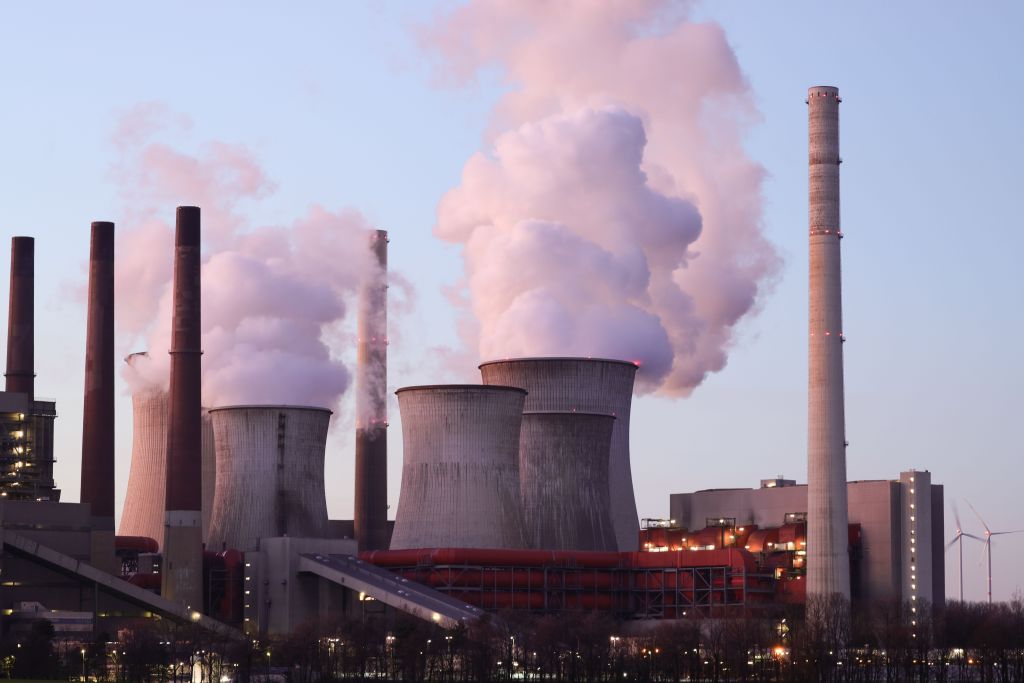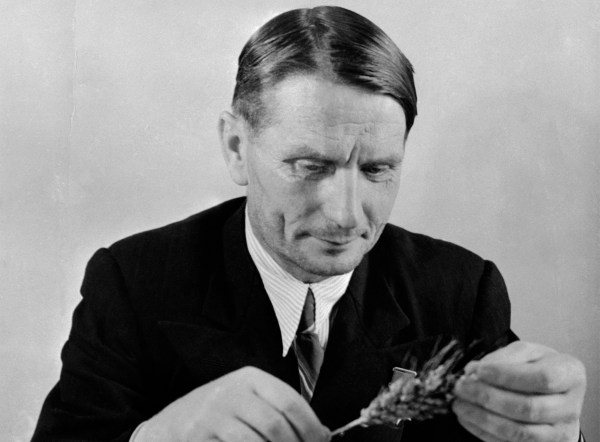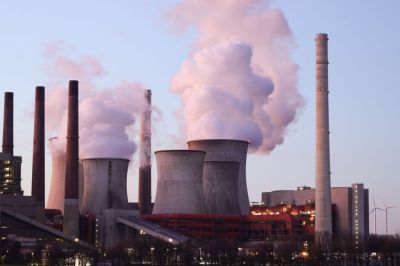There are two ways of thinking about a hard winter like the one we—and our European cousins—didn’t just have.
One is the optimism of Merle Haggard’s “If We Make It Through December,” in which a recently laid-off factory worker laments that his daughter’s Christmas will be a bare one but envisions a new start in the new year in a new place, “maybe even California.” (California, alas.) The other is the motto of the Stark family in Game of Thrones: “Winter is coming.”
Even in April, winter is coming—the next one.
Europe dodged a bullet this past winter, as a combination of factors—unusually mild weather (thanks, global warming!), reasonably nimble policy realism, and shiploads of liquified natural gas from the United States—went a long way toward counteracting the effects of Vladimir Putin’s energy war on Ukraine’s allies in the European Union. Only a few months ago, European governments from France to Finland were warning their citizens about the possibility of rolling winter blackouts. In Germany—home to what is arguably the world’s most technologically advanced manufacturing economy—people worried about blackouts sent candle sales soaring, while public-broadcasting stations spent months warning their listeners against building makeshift ovens to heat their homes.
The specter of the people of Germany—makers of Leica cameras and Siemens locomotives—shivering in the dark was scandalous even if averted. It was and is a scandal because the reliance of Germany on Russian gas exports was neither accidental nor inevitable. Neither was the vulnerability of the energy markets in much of the rest of Europe. The winter of 2022-23 has passed, but European energy vulnerability remains a problem, and it is a problem that was made not in Moscow but in Brussels and in European capitals from Amsterdam to Zagreb.
American exports can solve some of that problem, though building out the necessary infrastructure will be expensive and time consuming. But there isn’t enough American gas in the ground to make up for European pie-in-the-sky wishful thinking. As William F. Buckley Jr. once put it: “Idealism is fine, but as it approaches reality, the costs become prohibitive.”
The bad European decisions keep on coming. Earlier this month, Germany closed the last of its nuclear power plants. It did this after being obliged by the Ukraine crisis to fire up mothballed coal-powered electricity generation and deferring the planned closures of other coal plants. Annalena Baerbock has one eye on Moscow as Germany’s foreign minister and another on greenhouse-gas emissions as a leading member of the Green Party, and the displacement of clean nuclear power by coal has to be counted as a loss on both fronts, a failure to secure either German security interests or German climate goals. The cultic character of the environmental movement, whose most committed partisans oppose nuclear power because it offers a relatively clean and economic alternative to traditional power sources and hence threatens to contribute to the human flourishing they religiously oppose, is here on full display. The perverse fact is that one of the great impediments to a better climate and energy policy is the fanaticism of the most committed environmentalists.
Germany began phasing out its clean and efficient nuclear power in 2000 under a left-wing coalition government comprising Social Democrats and Greens; it continued that policy under Angela Merkel and her conservative Christian Democrats. Germany is not alone in its green utopianism. Spain’s Basque-Cantabrian Basin has some 8 trillion cubic feet of recoverable shale gas according to the U.S. Energy Information Administration, but Spain produces almost no gas. In the United Kingdom, the coal-fired power plants were replaced with natural-gas plants for environmental reasons, but then regulators began choking the domestic natural-gas industry, which has left Britons—85 percent of whom heat their homes with gas—dependent on imports. One of Prime Minister Rishi Sunak’s first acts in office was to reinstate the fracking ban suspended by his predecessor, meaning that the 1.3 trillion cubic feet of shale gas in the north of England is going to sit there in the ground, useless—even though a small fraction of it would make the United Kingdom gas-independent for decades to come while allowing it to become an exporter to gas-hungry Europe as well.
European energy politics can get pretty complicated: Spain would like to establish itself as the great gas-import hub for Europe, but this ambition has been hobbled by issues far removed from energy as such—notably, Spain’s strained relationships with Morocco and Algeria, which are at odds over the bid for independence by Western Sahara, a former Spanish colony.
These challenges are not trivial. But the biggest challenge is, if anything, more intractable than these nuts-and-bolts issues.
As I observed at the U. N. climate conference in Glasgow, European policymakers and intellectual leaders are in thrall to a phenomenon that is somewhere between a fad and a religious revival—consulting spiritual gurus, conducting indigenous rituals, and speaking in reverential tones about “net zero.” This is not strictly related to the question of how serious a challenge you believe climate change to be: I myself believe that climate change is a serious threat, and, more consequentially, so do the people at the Intergovernmental Panel on Climate Change. Net zero calls for a prelapsarian state in which “all GHG emissions”—that’s “greenhouse-gas” emissions—“released by human activities are counterbalanced by removing GHGs from the atmosphere,” as the World Resources Institute puts it. That net zero should be our shared goal is taken as something like an article of faith—but why? The IPCC estimates that a reduction in GHG emissions somewhere between 43 percent and 45 percent is needed to keep global warming to about 1.5°C, the stated goal of the Paris Agreement. That would be a very big deal, indeed, but nothing like what it would take to achieve net zero—and it is the absolutism and finality of that zero that demonstrates that you are dealing with ideology run amok or a quasi-mystical mania rather than responsible policymaking.
Natural gas is going to be a big part of the world’s fuel mix for the foreseeable future, in part because it is so much cleaner than alternatives such as coal and in part because there is a lot of it that can be had cheaply—if the politicians will allow it. There are serious environmental challenges related to natural gas, as there are with any meaningful fuel source, but those challenges are things like mitigating unintentional methane leaks from wells and pipelines, implementing sophisticated carbon-capture technologies, and developing cleaner and more efficient ways to extract hydrogen from natural gas.
Winter is coming. A mild winter gave Europeans a little breathing room, but that did not stop German home-heating prices from hitting an all-time high. And yet the Germans are doubling down on wishful thinking: After shutting down the nuclear plants, the German government has moved to prohibit new gas-fueled home-heating systems from being installed. Renewables are great and will surely be a growing part of the energy mix going forward, but the smoke coming out of those coal-fired plants testifies that these trendy, politically favored power sources are not yet ready to do the job.
It is time to get past the silliness and get to the real problem-solving. The Ukrainians can blame their energy woes on the Russians who are systematically destroying their power grid—but the other European nations have only their own leaders to blame.
The United States needs Europe to be strong—militarily and economically—because Washington needs liberal-democratic allies in the contest against China and its satellites, of which Russia is effectively now one. Unhappily, the same kind of wishful thinking that we see in Brussels is calcifying into conventional wisdom in Washington, too, as with the “Inflation Reduction Act” that was 97 percent a climate bill and at best 3 percent an inflation program. We shouldn’t let a few months of lower gasoline prices cause us to take our eye off the ball. Winter is coming to the United States, too.
Kevin D. Williamson is the national correspondent for The Dispatch and a writer in residence at the Competitive Enterprise Institute, which sponsored his attendance at the U.N. climate conference in Glasgow.







Please note that we at The Dispatch hold ourselves, our work, and our commenters to a higher standard than other places on the internet. We welcome comments that foster genuine debate or discussion—including comments critical of us or our work—but responses that include ad hominem attacks on fellow Dispatch members or are intended to stoke fear and anger may be moderated.
With your membership, you only have the ability to comment on The Morning Dispatch articles. Consider upgrading to join the conversation everywhere.